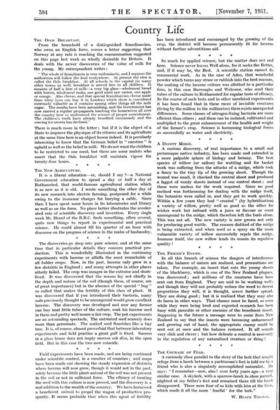The discoveries go deep into pure science, and at the
same time that in particular details they concern practical pro- duction. This is wonderfully illustrated in the continuing experiments with lucerne or alfalfa the most remarkable of all fodder crops. Now, in the past, lucerne only grew in a few districts in England ; and many attempts in other places utterly failed. The crop was meagre in the extreme and short- lived. It was discovered that the reason lay not chiefly in the depth and nature of the soil (though these, of course, are of great importance) but in the absence of the special " bug " so called that makes the fertility of this class of plant. It was discovered that if you introduced their bacteria, many soils previously thought to be uncongenial would grow excellent lucerne. The discovery was developed and now any farmer can buy neat little tubes of the culture, soak his lucerne seed in them and pretty well insure a fair crop. The pot experiments are an astounding spectacle. The untreated seed scarcely does more than germinate. The soaked seed flourishes like a bay tree. It is, of course, almost proverbial that between laboratory experiments and field practice a great gulf is fixed. Success in a glass house does not imply success sub divo, in the open field. But in this case the two now coincide.
* * * *














































 Previous page
Previous page